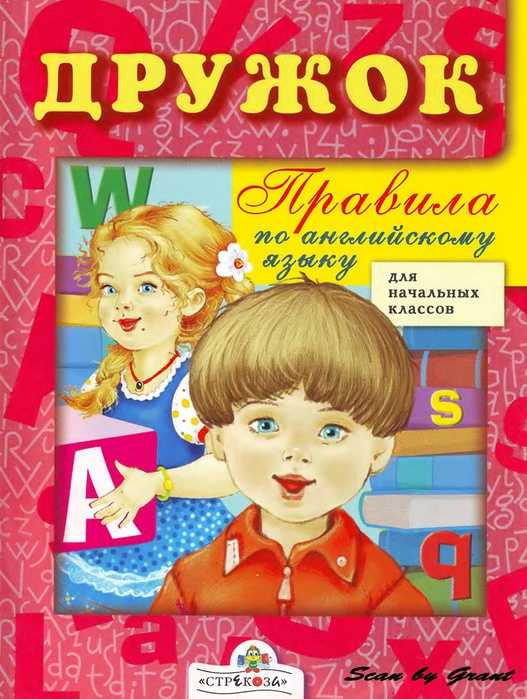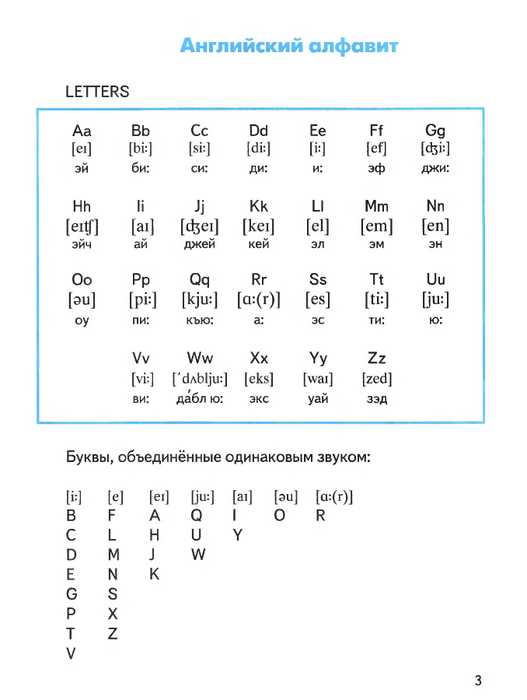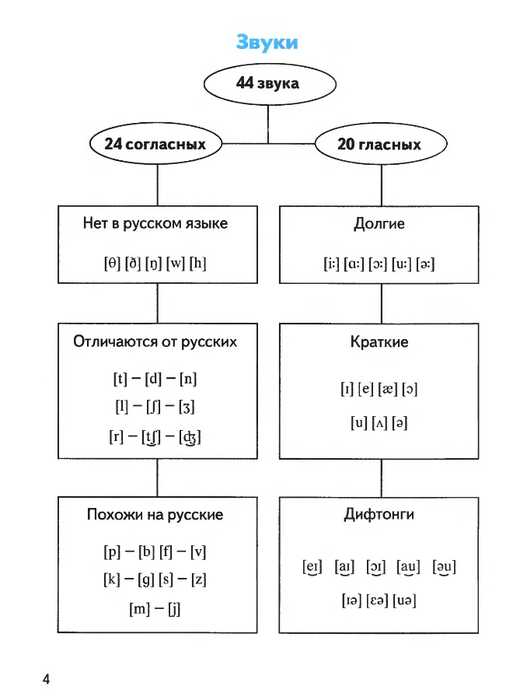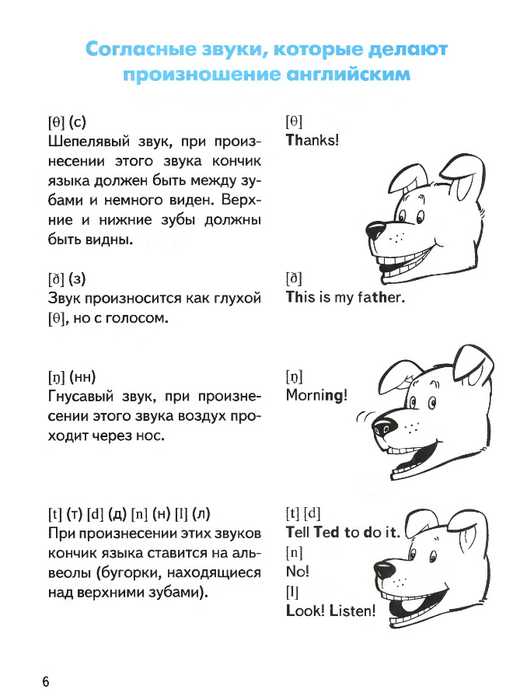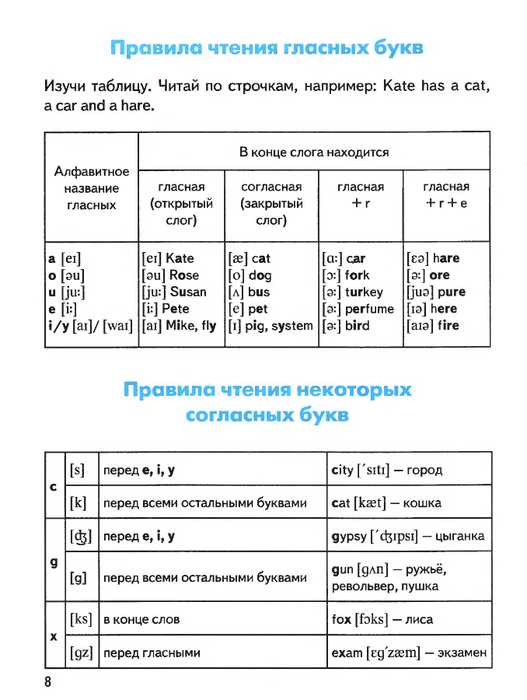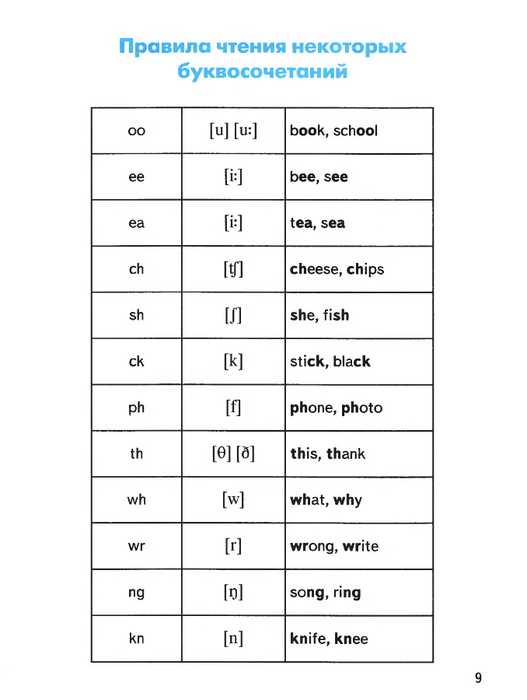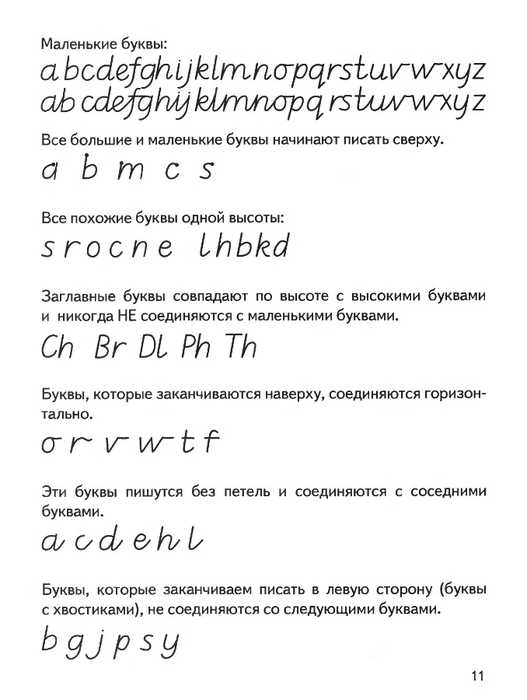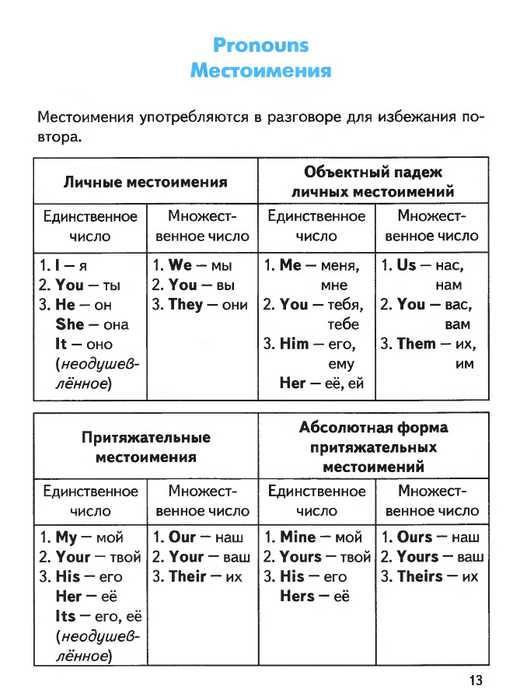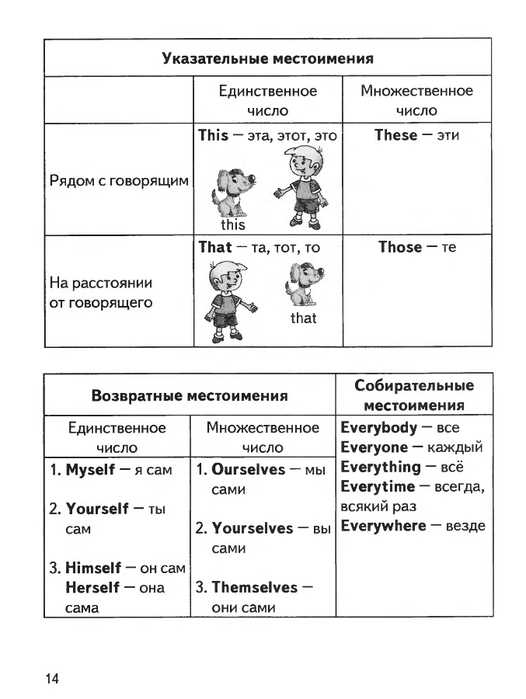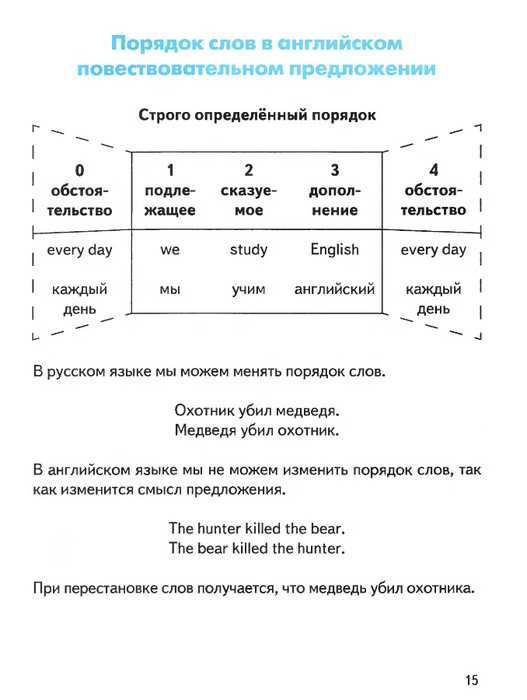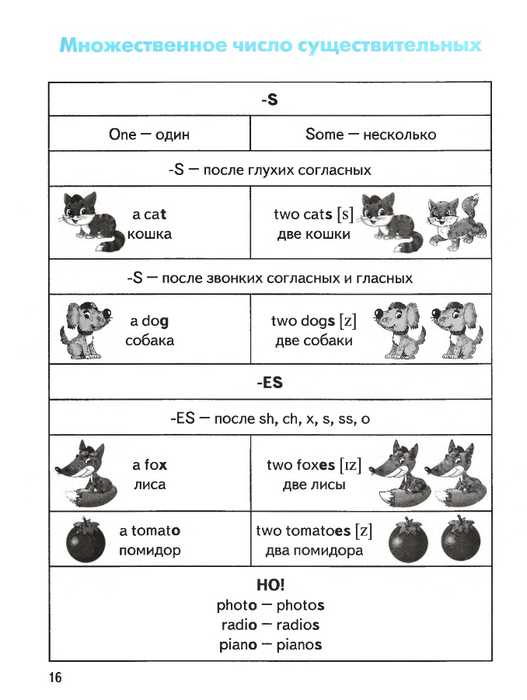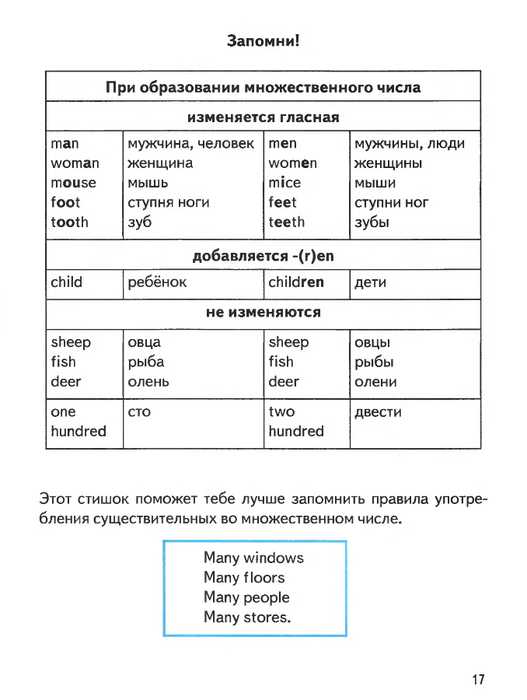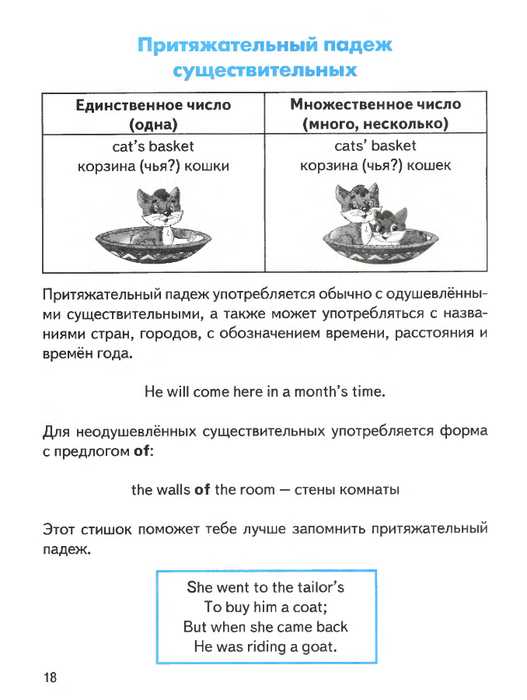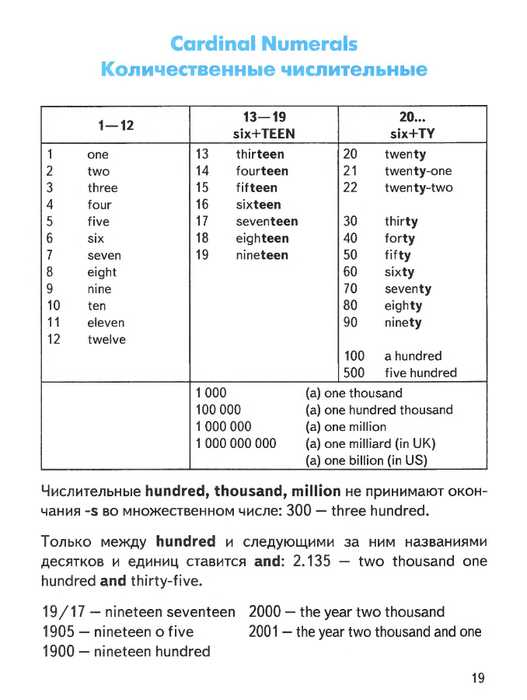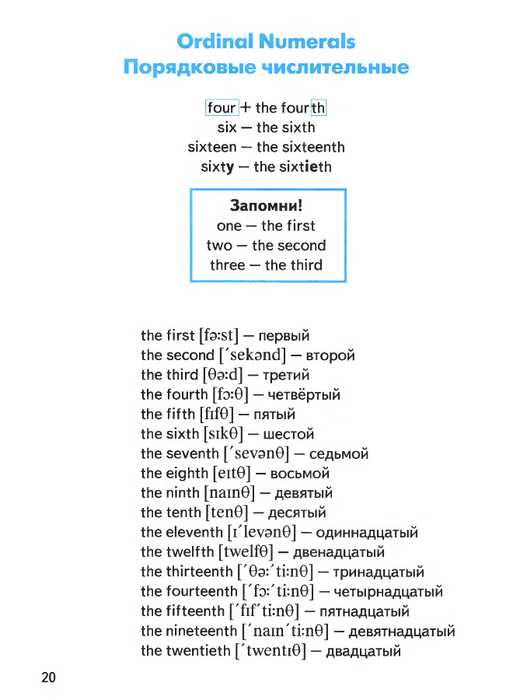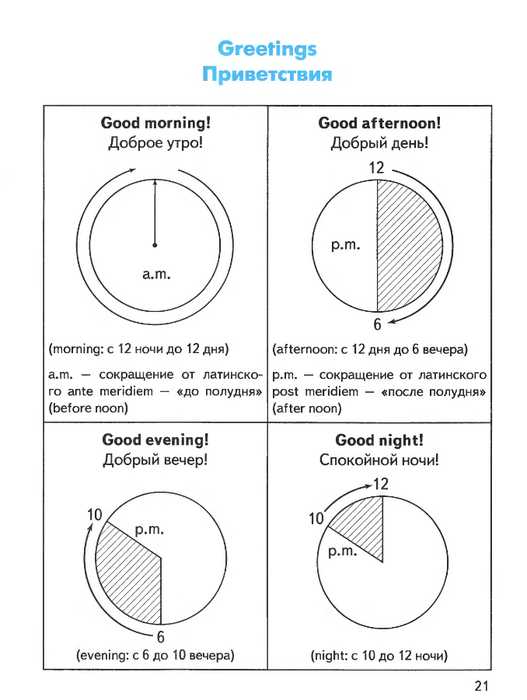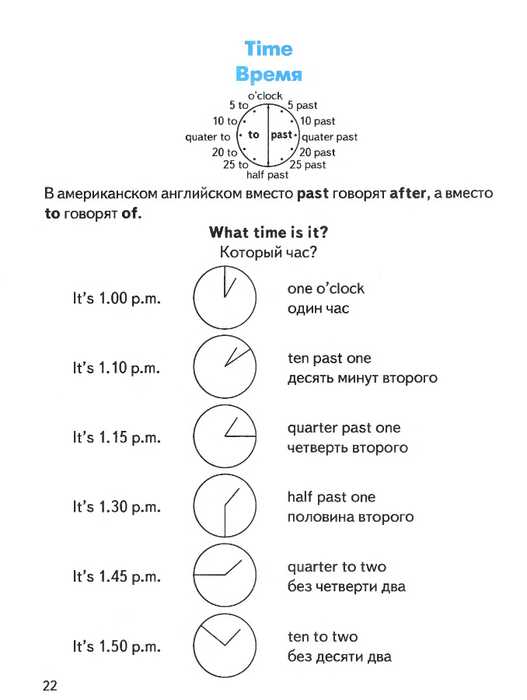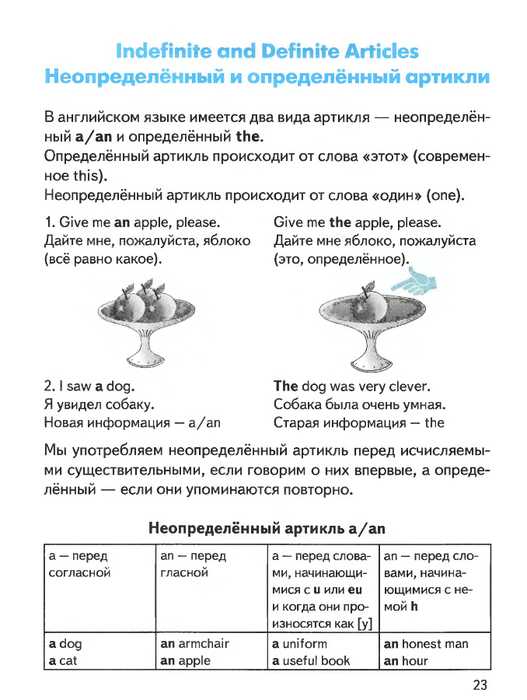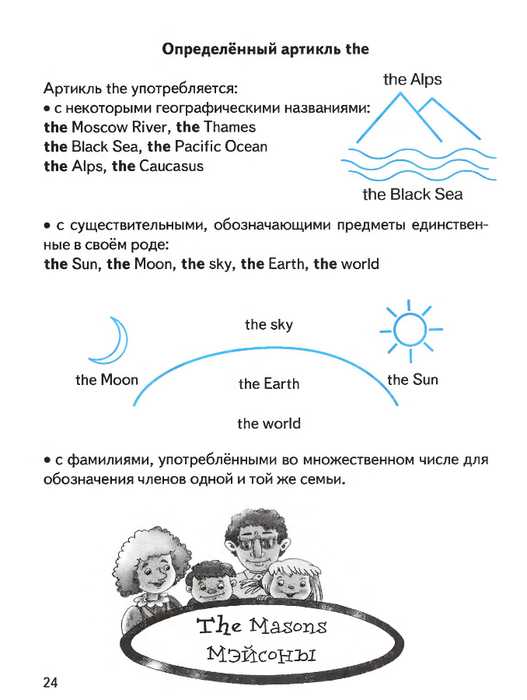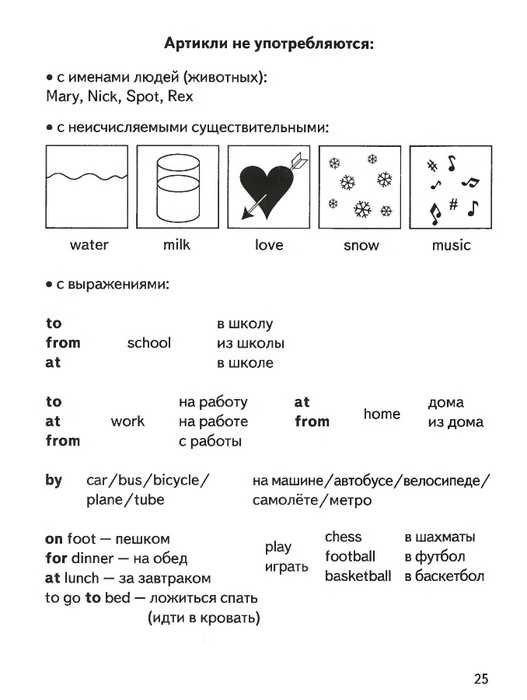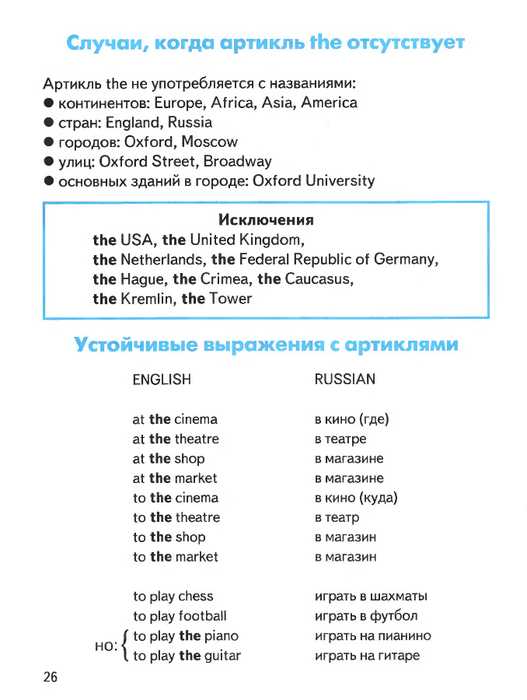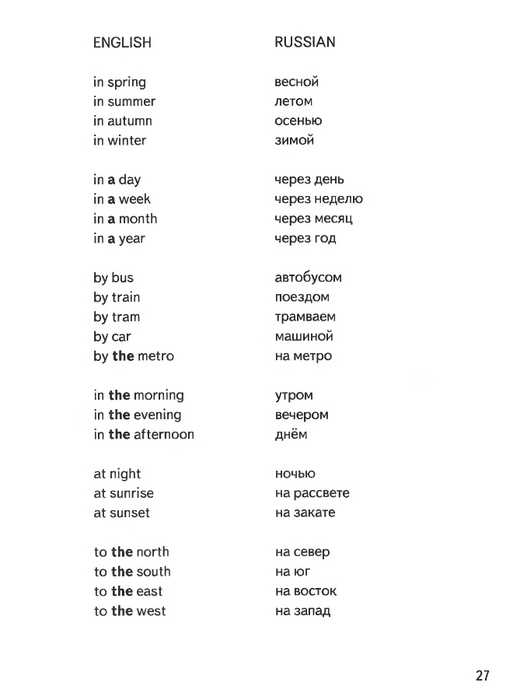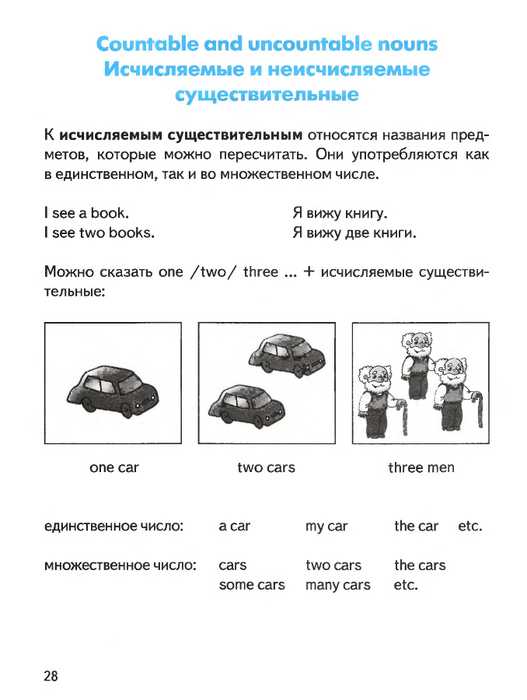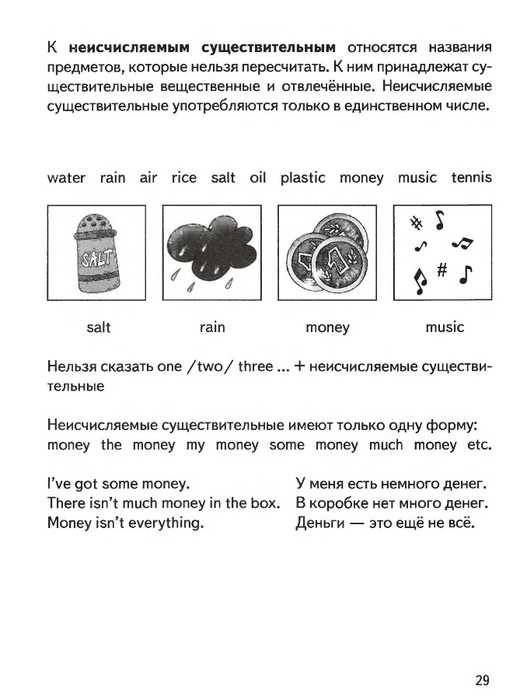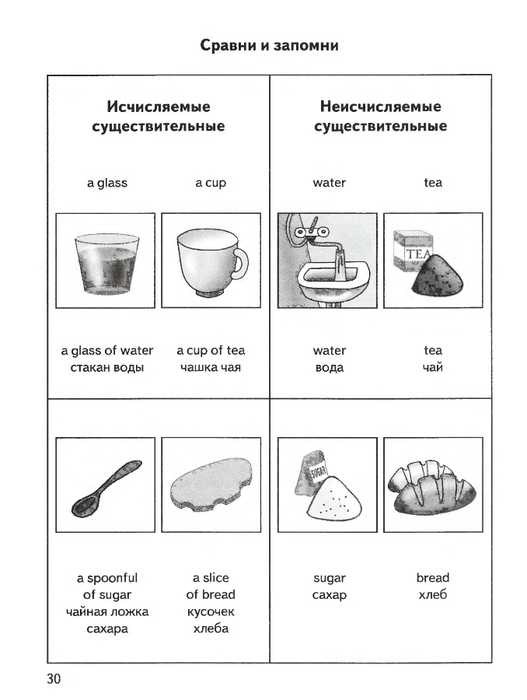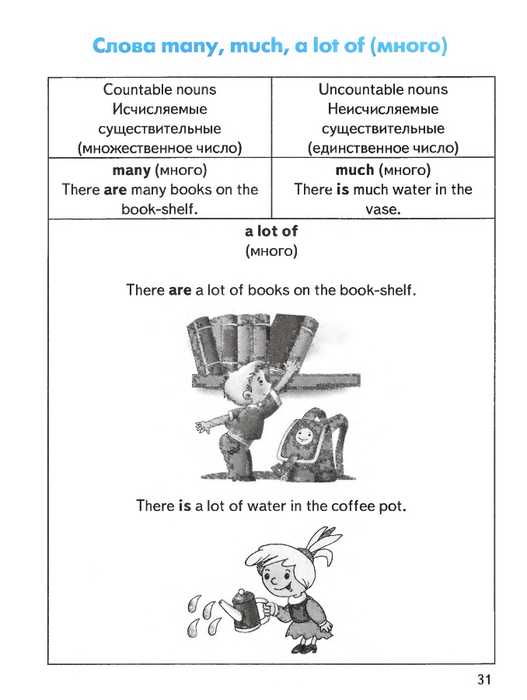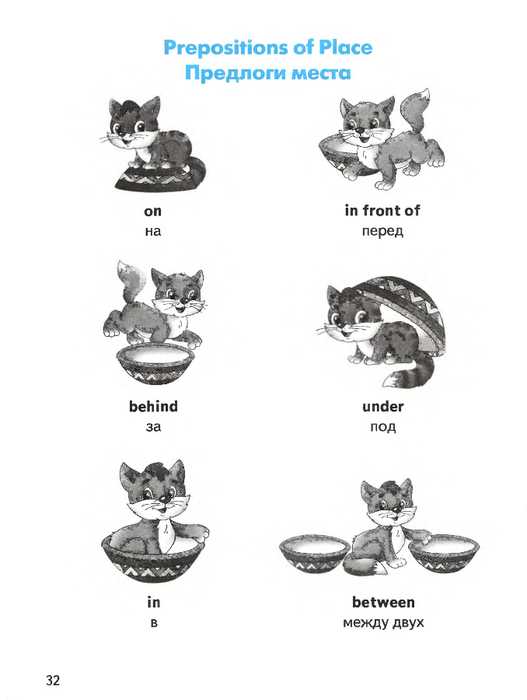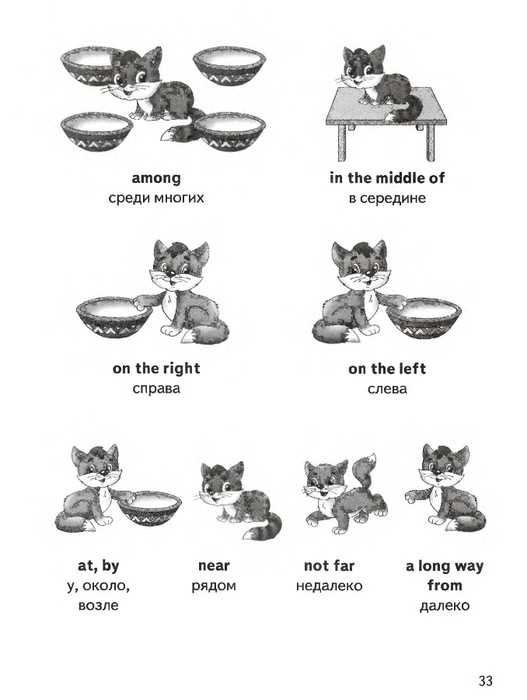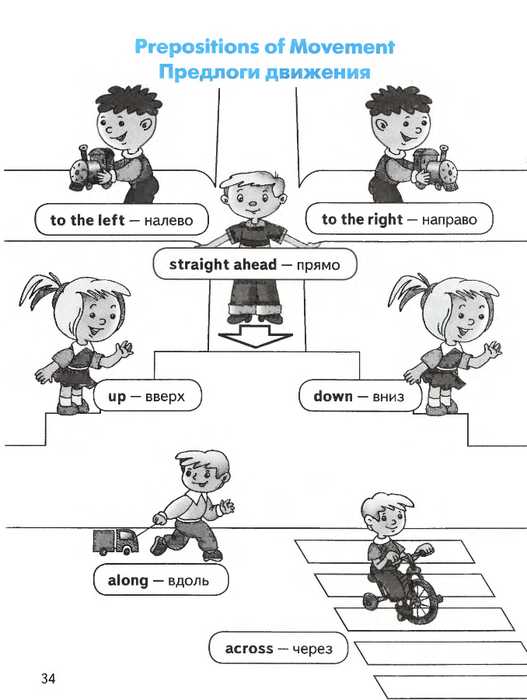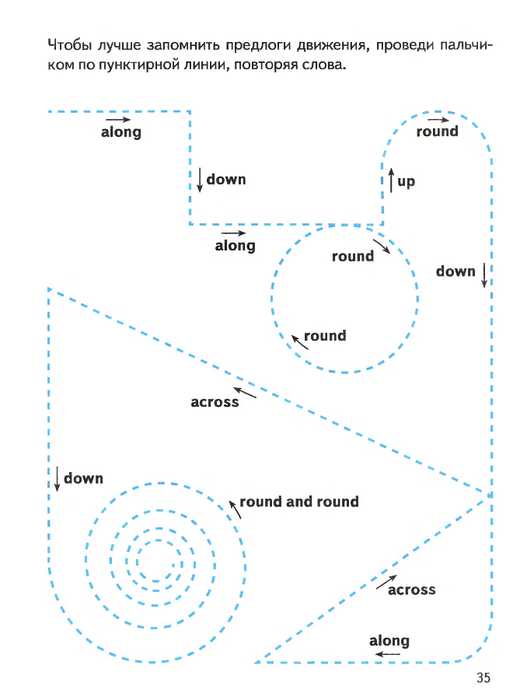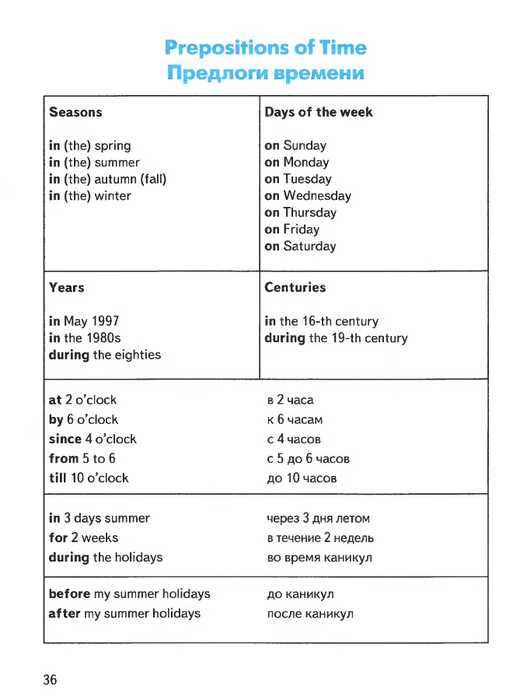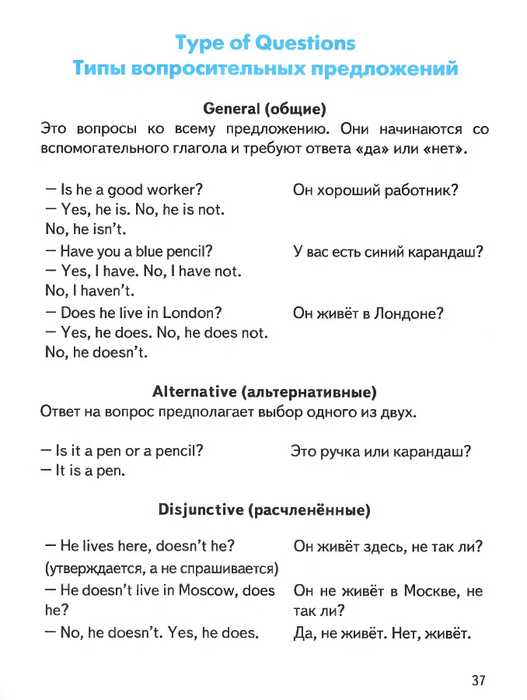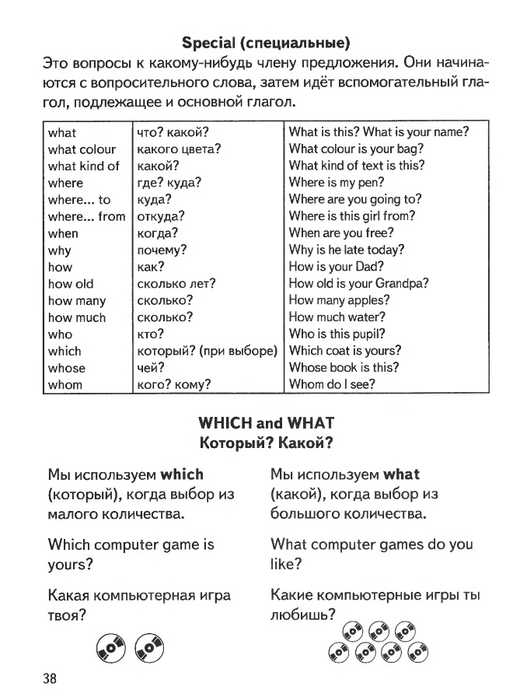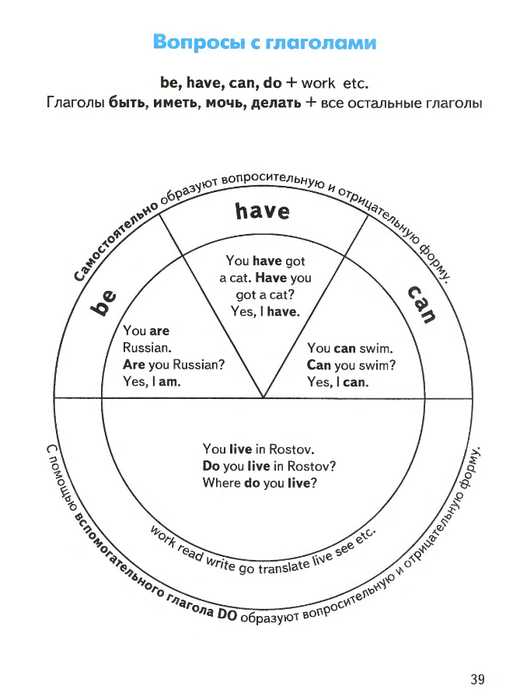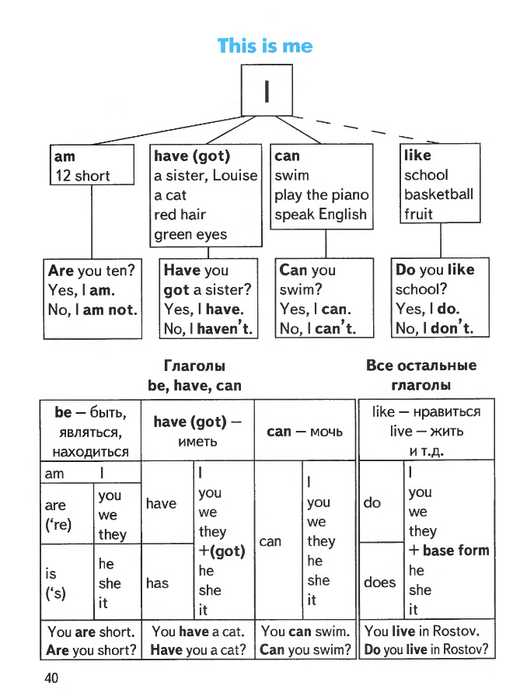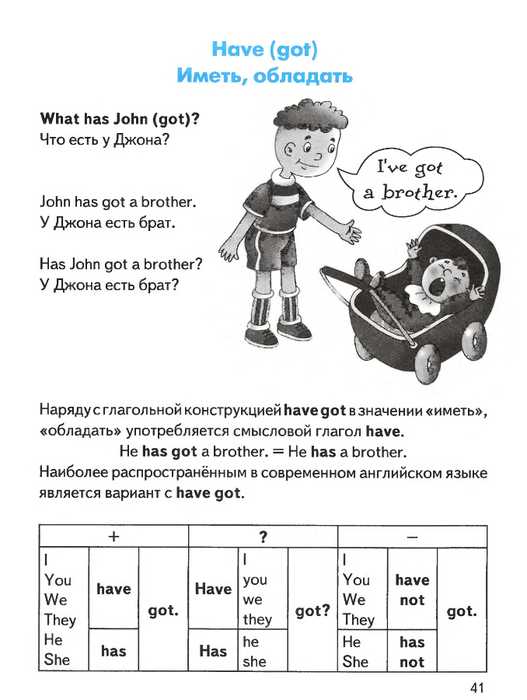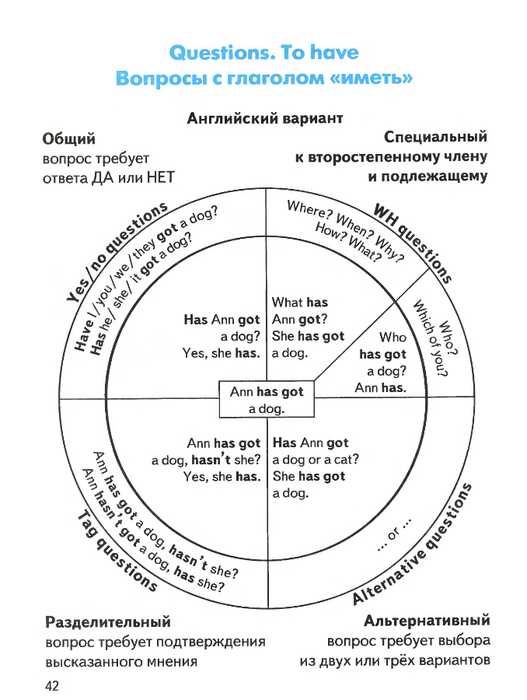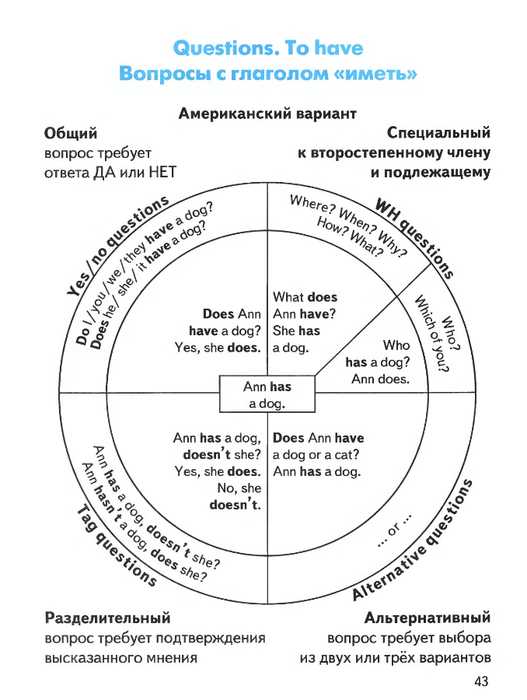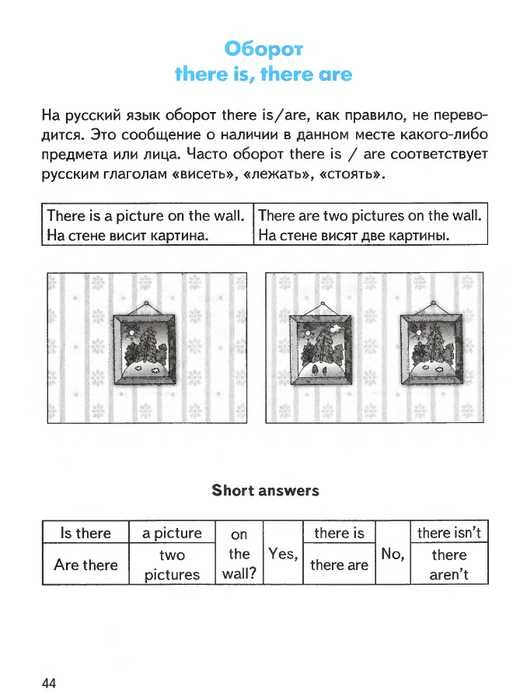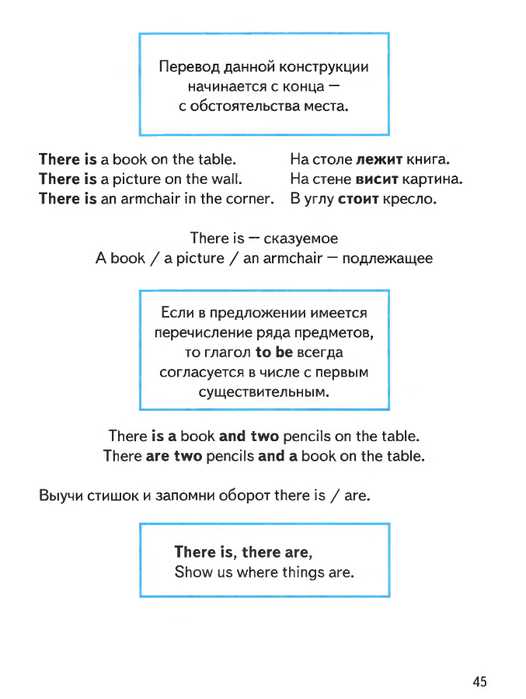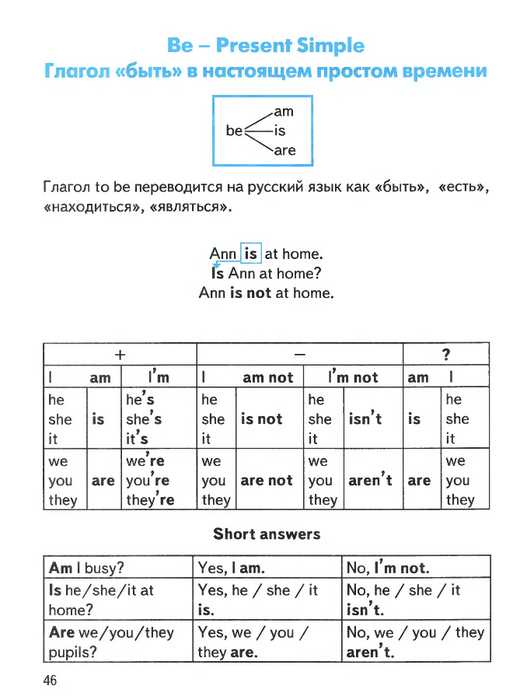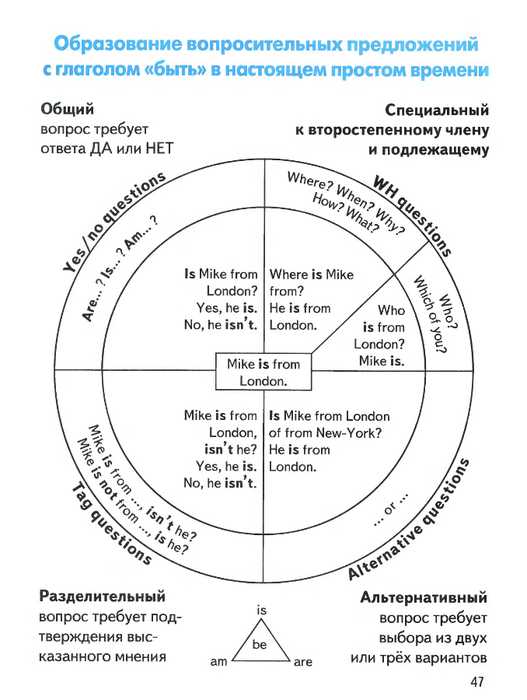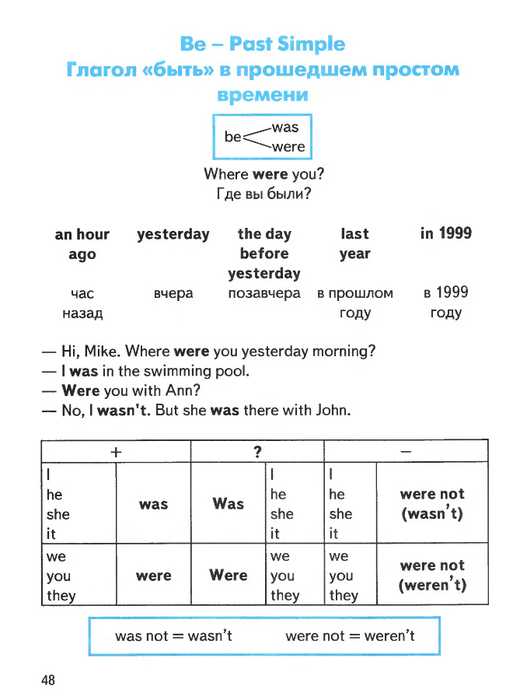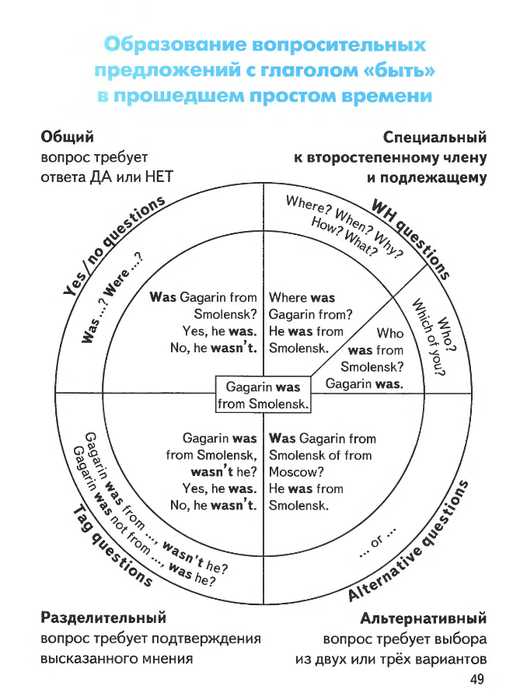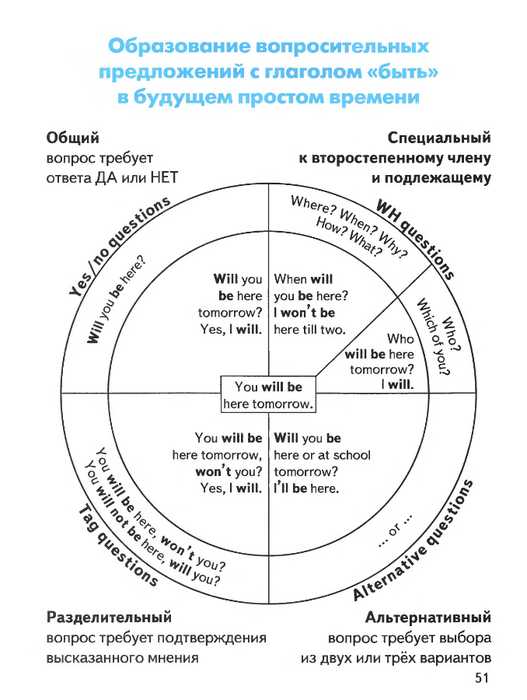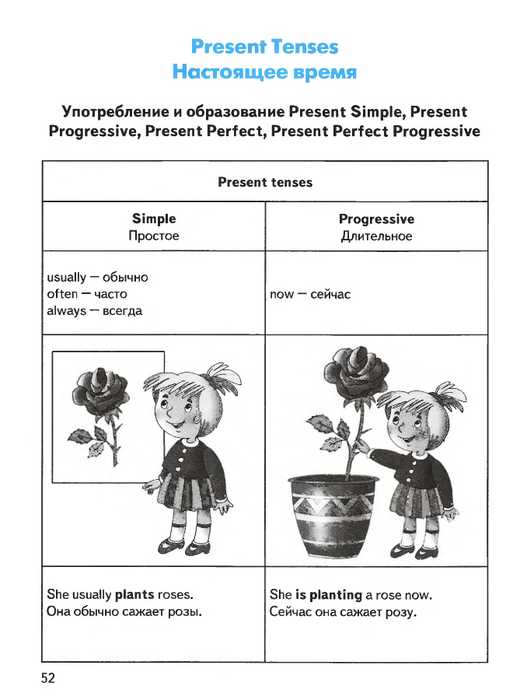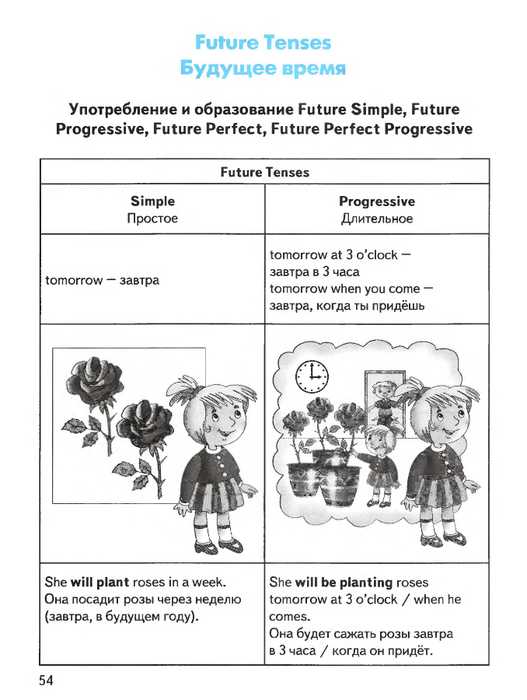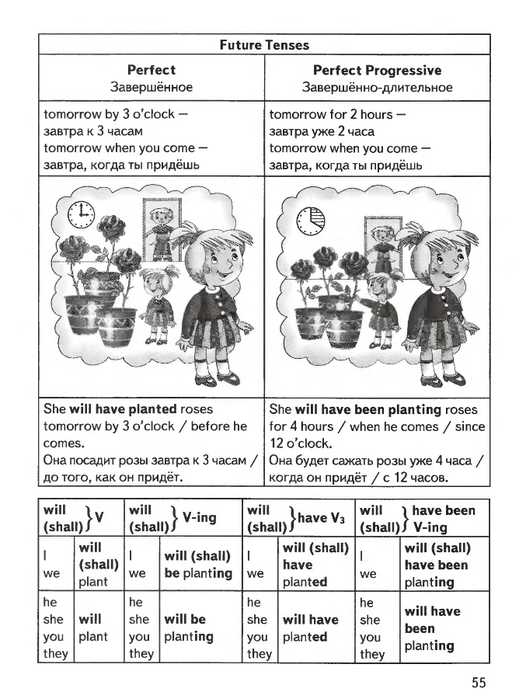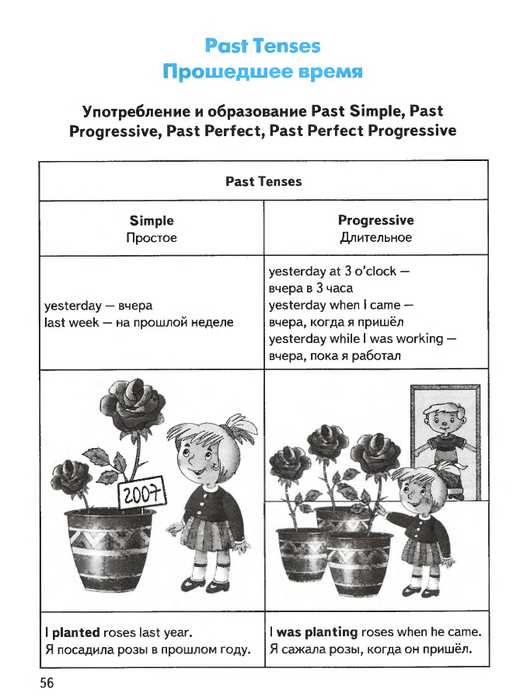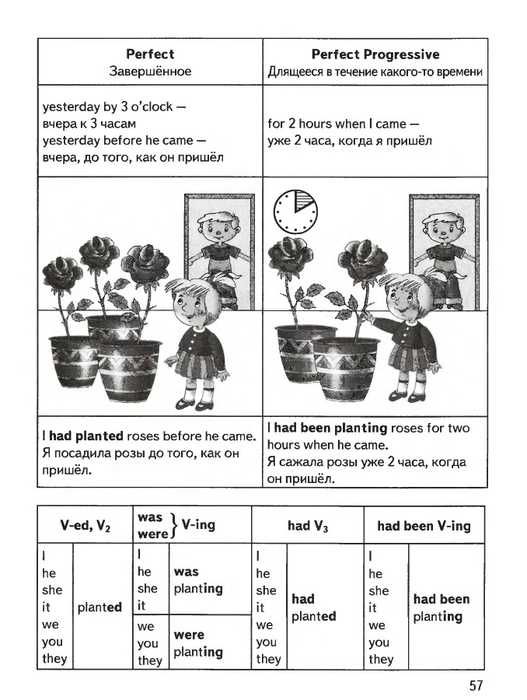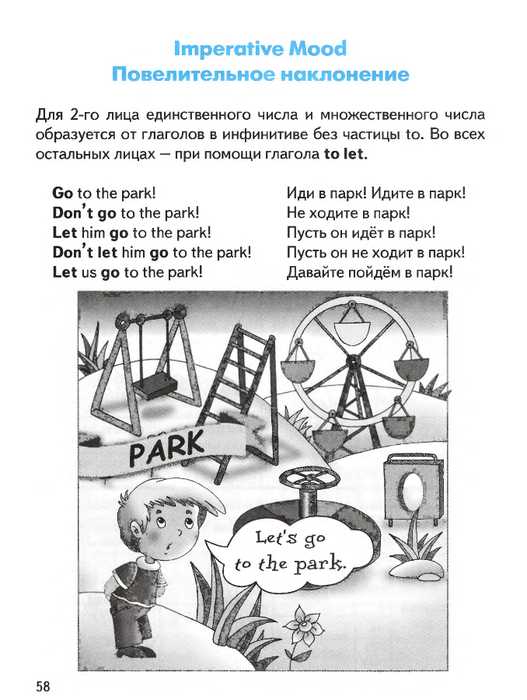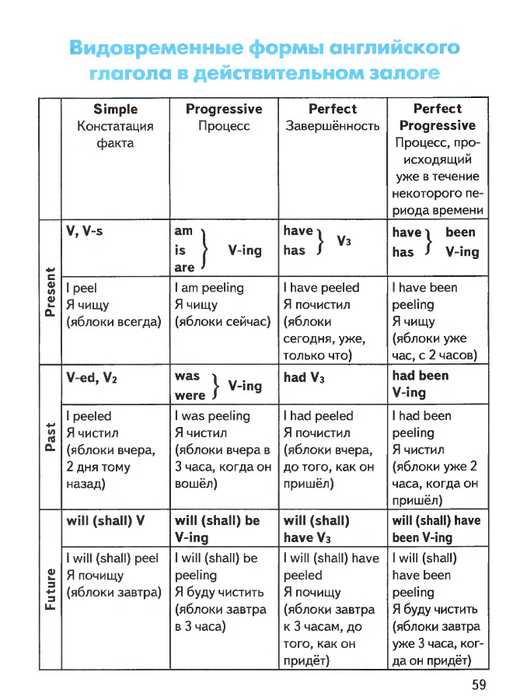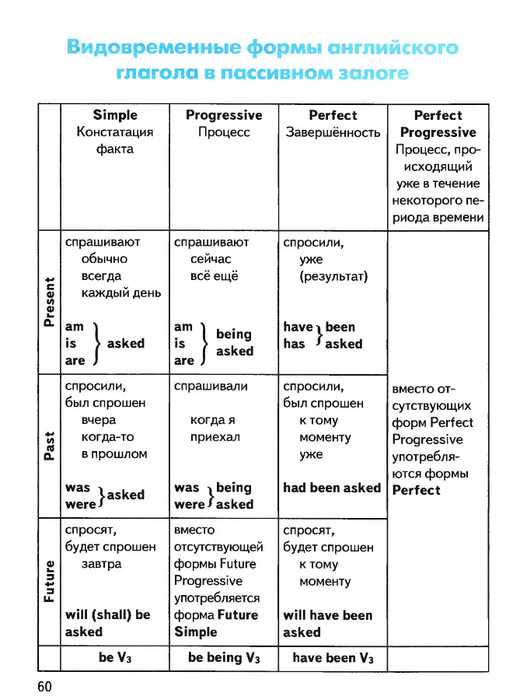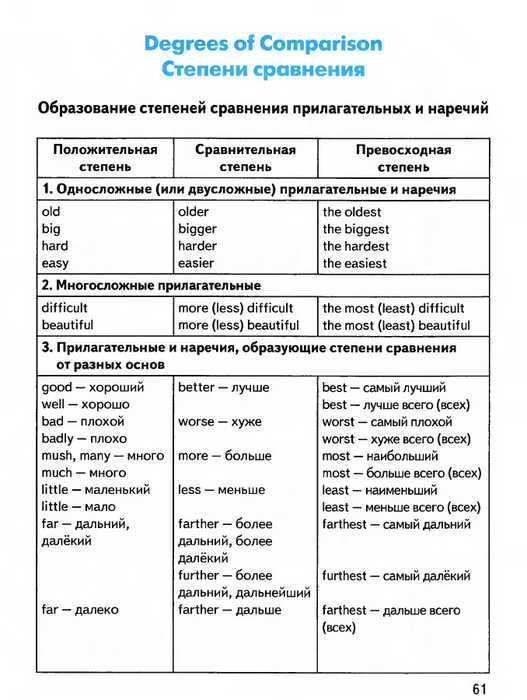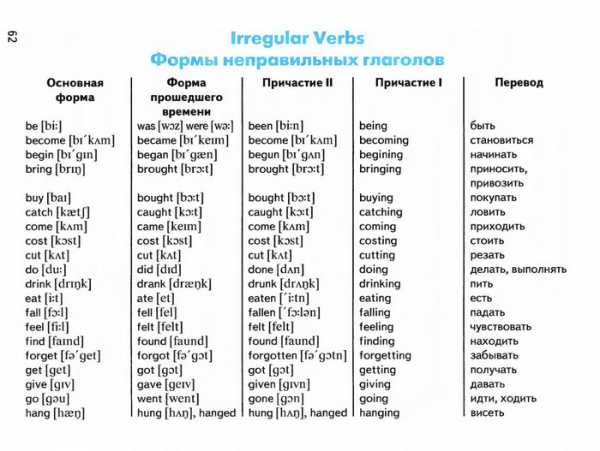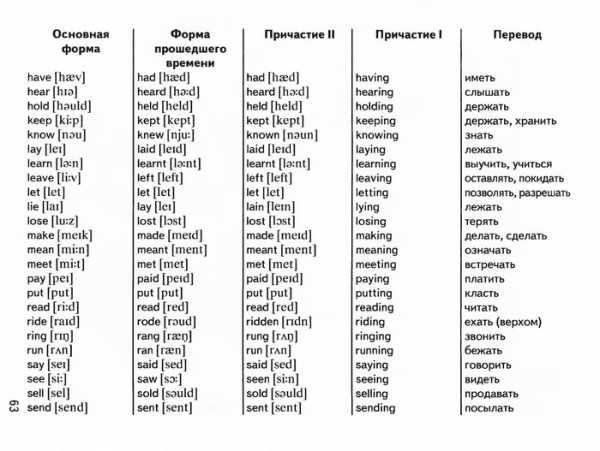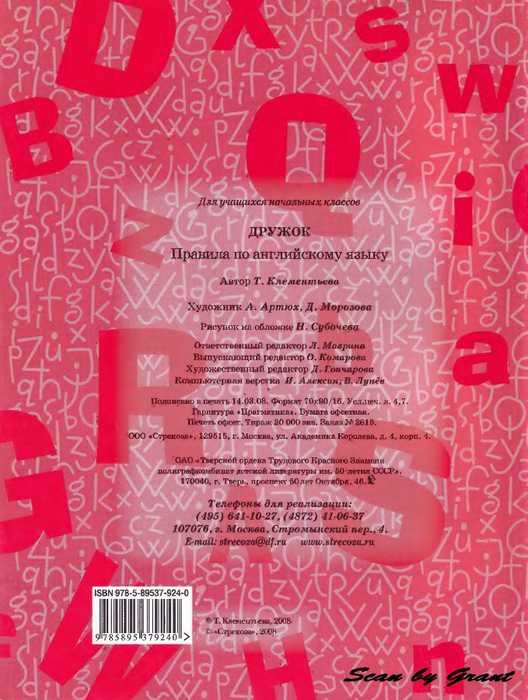Грамматика для 4 класса по английскому языку – Памятки с грамматическими правилами по английскому языку для 4 класса
Памятки с грамматическими правилами по английскому языку для 4 класса
Грамматика английского языка 4 класс
Указатели времени (сигналы), употребляемые с Present Simple:
every hour – каждый час
every day – каждый день
every week – каждую неделю
every month – каждый месяц
every summer – каждое лето
every year – каждый год
usually – обычно
always – всегда
every morning – каждое утро
every evening – каждый вечер
every night – каждую ночь
in the morning – утром, по утрам
in the afternoon – днём
on Mondays – по понедельникам
once a week – один раз в неделю
twice a week – два раза в неделю
three times a week – три раза в неделю
Have to — Don`t have to
Употребление
I have to be at school at 9 o`clock.
Do you have to
Yes, I do. Да.
Peter doesn`t have to go to school on Saturday. Пётру не нужно ходить в школу по субботам.
Much/Many/ A lot of
Употребление
There isn`t much butter in the fridge. – В холодильнике есть немного масла.
Is there much sugar in the tea? – В чае много сахара?
There aren`t many apples in the bag. – В сумке немного яблок.
Are there many girls in your class? – В твоём классе много девочек?
She`s got a lot of friends. – У неё много друзей.
There is a lot of cheese in the fridge. – В холодильнике много сыра.
May употребляется, чтобы спросить разрешения (официальная форма).
May I leave the classroom? – Можно выйти из класса?
Must /Mustn`t
Must употребляется тогда, когда говорят, что действие должно быть обязательно выполнено.
I must put my rubbish in the bin. – Я обязательно должен убрать мусор в корзину.
Must not (Mustn`t) употребляется, когда запрещают что-то делать.
You must not run. – Тебе нельзя бегать.
Сравнительная степень прилагательных
Прилагательное
Сравнительная степень
small
smaller
big
bigger
busy
busier
popular
more popular
Односложные и двусложные прилагательные, оканчивающиеся на –y, образуют сравнительную степень путём добавления –er.
Old – older (than) — Старый (старший) – старше (чем)
Beautiful — more beautiful (than) Красивый – красивее
Правила правописания
Nice — nicer (милый – милее)
Thin — thinner (тонкий – тоньше)
Funny — funnier ( забавный – забавнее)
Глагол to be (Past Simple)
Утверждение
Вопрос
I was Я был
Was I? Был ли я?
You were Ты был
Were you? Был ли ты?
He was Он был
Was he? Был ли он?
She was Она была
Was she? Была ли она?
It was … был
Was it? Был ли …?
We were Мы были
Were we? Были ли мы?
You were Вы были
Were you? Были ли вы?
They were Они были
Were they? Были ли они?
Отрицание
Полная форма
Краткая форма
I was not Я не был
You were not Ты не был
He was not Он не был
She was not Она не была
It was not … не был
We were not Мы не были
You were not Вы не был
They were not Они не были
I wasn`t
You weren`t
He wasn`t
She wasn`t
It wasn`t
We weren`t
You weren`t
They weren`t
Краткие ответы
В кратких ответах используется Yes или No, личное местоимение (I, You, he …) и глагол to be в соответствующей форме.
Were you at the cinema yesterday? — Yes, I was / we were
No, I wasn`t/ we weren`t
Was he at the cinema yesterday? — Yes, he was
No, he wasn`t.
Указатели времени (сигналы), употребляемые с Past Simple:
Yesterday – вчера
Last week — на прошлой неделе
Last month — в прошлом месяце
Last year — в прошлом году
Five weeks ago — пять недель назад
Three years ago – три года назад
In 1975 – в 1975 году…
Ordinal Numbers – Порядковые числительные
— the first (1st)
— the second (2nd)
— the third (3rd)
— the fourth (4th)
— the fifth (5th)
— the sixth (6th)
— the seven (7th)
— the eighth (8th)
— the ninth (9th)
— the tenth (10th)
— the eleventh (11th)
— the twelfth (12th)
— the thirteenth (13th)
— the fourteenth (14th)
— the fifteenth (15th)
— the sixteenth (16th)
— the seventeenth (17 th)
— the eighteenth (18th)
— the nineteenth (19th)
— the twentieth (20th)
— the twenty-first (21st)
— the twenty-second (22nd)
— the twenty- third (23rd)
— the twenty fourth (24th)
— the twenty-fifth (25th)
— the twenty-sixth (26th)
— the twenty-seventh (27th)
Past Simple – Прошедшее простое время
Употребляется, когда речь идёт о действиях, которые происходили в прошлом.
Утверждение
Вопрос
I worked
You worked
He worked
She worked
It worked
We worked
You worked
They worked
Did I work?
Did you work?
Did he work?
Did she work?
Did it work?
Did we work?
Did you work?
Did they work?
Отрицание
Полная форма
Краткая форма
I did not work
You did not work
He did not work
She did not work
It did not work
We did not work
You did not work
They did not work
I didn`t work
You didn`t work
He didn`t work
She didn`t work
It didn`t work
We didn`t work
You didn`t work
They didn`t work
Утвердительная форма
—ed к начальной форме смыслового глагола.
Kate visited her granny yesterday.
Отрицательная формаdid not (didn`t) и смыслового глагола без –ed.
She didn`t play the violin on Sunday.
Вопросительная форма
did + подлежащее = смысловой глагол без –ed.
Did she help her mother last night?
Краткие ответы
В кратких ответах используется Yes или No, личное местоимение (I, you, he и др.) и глагол did.
Yes, I / we did.
Did you go? — No, I / we didn`t.
Yes, he / she / it did.
Did he / she / it go? — No, he / she / it didn`t.
Yes, they did.
Did they go? — No, they didn`t.
Past Simple (irregular verbs) – Прошедшее простое время неправильных глаголов.
Прошедшее простое время неправильных глаголов образуется не путём прибавления
They had a lot of fun yesterday.
Did he go surfing last week?
He didn`t see this film yesterday.
Superlatives – Превосходная степень прилагательных.
Прилагательное
Сравнительная степень
Превосходная степень
tall
tasty
fat
interesting
taller
tastier
fatter
more interesting
the tallest
the tastiest
the fattest
the most interesting
Односложные и двусложные прилагательные, оканчивающиеся на согласную или на –y, образуют превосходную степень путём добавления –est.
Fast – faster – fastest
Beautiful – more beautiful – most beautiful
Исключения
Прилагательное
Сравнительная степень
Превосходная степень
good — хороший
bad- плохой
better- лучше
worse- хуже
the best- самый лучший (наилучший)
the worst- самый плохой (наихудший)
Be Going To (собираться, намереваться)
Утверждение
Вопрос
I am going to swim.
You are going to swim
He is going to swim
It is going to swim.
We are going to swim.
You are going to swim.
They are going to swim.
Am I going to swim?
Are you going to swim?
Is he going to swim?
Is she going to swim?
Is it going to swim?
Are we going to swim?
Are you going to swim?
Are they going to swim?
Отрицание
Полная форма
Краткая форма
I am not going to swim.
You are not going to swim.
He is not going to swim.
She is not going to swim.
It is not going to swim.
We are not going to swim.
You are not going to swim.
They are not going to swim.
I`m not going to swim.
You aren`t going to swim.
He isn`t going to swim.
She isn`t going to swim.
It isn`t going to swim.
We aren`t going to swim.
You aren`t going to swim.
They aren`t going to swim.
Утвердительная форма
Утвердительные предложения образуются при помощи глагола to be (am,is,are) + going to + основная форма смыслового глагола.
He is going to watch a film tonight.
Отрицательная форма
He is not going to watch a film tonight.
Вопросительная форма
Is he going to watch a film tonight?
Употребление
I am going to go to a party. – Я собираюсь пойти на вечеринку.
Future Simple (will) – Будущее простое время.
Утверждение
Полная форма
Краткая форма
I will travel
You will travel
He will travel
She will travel
It will travel
We will travel
You will travel
They will travel
I`ll travel
You`ll travel
He`ll travel
She`ll travel
It`ll travel
We`ll travel
You`ll travel
They`ll travel
Отрицание
Полная форма
Краткая форма
I will not travel
You will not travel
He will not travel
She will not travel
It will not travel
We will not travel
You will not travel
They will not travel
I won`t travel
You won`t travel
He won`t travel
She won`t travel
It won`t travel
We won`t travel
You won`t travel
They won`t travel
Вопрос
Will I travel?
Will you travel?
Will he travel?
Will she travel?
Will it travel?
Will we travel?
Will you travel?
Will they travel?
Утвердительная форма
He will watch a video.
Отрицательная форма
He will not/won`t visit his cousin.
Вопросительная форма
will + подлежащее + основная форма смыслового глагола
Will he go to school today?
Краткие ответы
Yes, I will. Yes, we will.
Will you eat? — No, I won`t./ No, we won`t.
Yes, he/she/it will.
Will he/she/it eat? – No, he/she/it won`t.
Will they eat? – Yes, they will.
No, they won`t.
Употребление
— о предсказаниях будущих событий.
You will be a great teacher one day.
— об обещаниях и решениях, принятых в момент речи.
I`ll buy you a new car.
Указатели времени (сигналы), употребляемые с Future Simple:
Tomorrow – завтра
Next week – на следующей неделе
Next month – в следующем месяце
Next year – в следующем году
Soon — вскоре
www.metod-kopilka.ru
Упражнения по английскому для 4 класса
Данная подборка упражнений для 4 класса составлена Казаковой Е.В. и является 2 вариантом этого теста.
Автор: Казакова Елена Владимировна – частный репетитор. Новосибирск.
Представленные упражнения для 4 класса охватывают следующие темы:
Лексико-грамматические упражнения для 4 класса. Variant II
- Match the words with the translation. (Соотнесите слова с их переводом)
Friend Yesterday Lamp Cinema Seaside Picture Homework Ticket Money Happy Parents Birthday Clever Book | День рождения Картина Лампа Домашняя работа Друг Умный Билет Кино Деньги Счастливый Книга Вчера Родители Морской берег |
2. Insert have or has. (Вставьте have или has )
1) They _____ got 7 lessons today.
2) My friends _____ got a lot of money.
3) I ________ got a brother and 2 sisters.
4) My parents ________ got blue eyes.
5) My grandmother ________got dark hair.
III. Choose the right option. (Выберите верный вариант)
1) His parents am\is\are kind.
2) My mother clean \cleans the rooms every day.
3) Do\Does you go to work every day?
4) My sisters don’t\doesn’t like to read.
5) He wear /wears a hat on his head.
6) I wear helmet \gloves on my hands.
4. Give short answers. (Дайте короткие ответы)
1) Do you go to school every day? | |
2) Can you play computer? | |
3) Can your brother swim? | |
4) Has your mother got a book? | |
5) Does your friend wash the dishes? | |
6) Are there two bedrooms in your flat? | |
7) Have your parents got roller-skates? | |
8) Is there a kitchen in your flat? |
5. Write negatives and questions.(Напишите отриц. и вопросит. предложения)
I am a baker. | ||
He has got a cat. | ||
I play computer every day. | ||
She always takes a shower. | ||
My dad can drive. | ||
There is a bag on the table. |
Надеюсь, Вам понравились эти упражнения по английскому языку для 4 класса.
Понравилось? Сохраните на будущее и поделитесь с друзьями!
grammar-tei.com
ГРАММАТИКА АНГЛИЙСКОГО ЯЗЫКА 4 класс — Книга для родителей к учебнику И. Н. Верещагиной
ГРАММАТИКА АНГЛИЙСКОГО ЯЗЫКА 4 класс — Книга для родителей к учебнику И. Н. Верещагиной — 2016 год
ОТ АВТОРА
§ 1. МНОЖЕСТВЕННОЕ ЧИСЛО СУЩЕСТВИТЕЛЬНЫХ
§ 2. СУЩЕСТВИТЕЛЬНЫЕ, УПОТРЕБЛЯЮЩИЕСЯ ТОЛЬКО В ЕДИНСТВЕННОМ ЧИСЛЕ
§ 3. СУЩЕСТВИТЕЛЬНЫЕ, УПОТРЕБЛЯЮЩИЕСЯ ТОЛЬКО ВО МНОЖЕСТВЕННОМ ЧИСЛЕ
§ 4. ПРИТЯЖАТЕЛЬНЫЙ ПАДЕЖ СУЩЕСТВИТЕЛЬНЫХ
§ 5. СТЕПЕНИ СРАВНЕНИЯ ПРИЛАГАТЕЛЬНЫХ
§ 6. НАРЕЧИЯ
§ 7. ЛИЧНЫЕ МЕСТОИМЕНИЯ
§ 8. ПРИТЯЖАТЕЛЬНЫЕ МЕСТОИМЕНИЯ
§ 9. УКАЗАТЕЛЬНЫЕ МЕСТОИМЕНИЯ
§ 10. МЕСТОИМЕНИЯ some, any, no, something, anything, nothing, somebody, anybody, nobody, every, everything, everybody
§ 11. ОСОБЕННОСТИ УПОТРЕБЛЕНИЯ СЛОВ never, no, nothing, nobody
§ 12. a lot of, many, much
§ 13. little и few
§ 14. a little и a few
§ 15. less и fewer
§ 16. ОТНОСИТЕЛЬНЫЕ МЕСТОИМЕНИЯ who и which
§ 17. АРТИКЛЬ
§ 18. ЧИСЛИТЕЛЬНЫЕ
§ 19. СЛОВА hundred, thousand, million
§ 20. СИСТЕМА ВРЕМЕН
§ 21. ФОРМЫ ГЛАГОЛА
§ 22. PRESENT INDEFINITE. НАСТОЯЩЕЕ НЕОПРЕДЕЛЕННОЕ ВРЕМЯ
§ 23. PRESENT CONTINUOUS. НАСТОЯЩЕЕ ПРОДОЛЖЕННОЕ ВРЕМЯ
§ 24. PAST INDEFINITE. ПРОШЕДШЕЕ НЕОПРЕДЕЛЕННОЕ ВРЕМЯ
§ 25. PRESENT PERFECT. НАСТОЯЩЕЕ СОВЕРШЕННОЕ ВРЕМЯ
§ 26. PAST INDEFINITE ИЛИ PRESENT PERFECT? ОСНОВНОЕ ОТЛИЧИЕ
§ 27. PRESENT PERFECT ИЛИ PAST INDEFINITE? НЕКОТОРЫЕ ЗАМЕЧАНИЯ
§ 28. FUTURE INDEFINITE. БУДУЩЕЕ НЕОПРЕДЕЛЕННОЕ ВРЕМЯ
§ 29. ОБОРОТ be going to
§ 30. МОДАЛЬНЫЙ ГЛАГОЛ саn И ЕГО ЭКВИВАЛЕНТ be able to
§ 31. МОДАЛЬНЫЙ ГЛАГОЛ must
§ 32. ГЛАГОЛ must И ЕГО ЭКВИВАЛЕНТ have to
§ 33. КОНСТРУКЦИЯ There is / There are
§ 34. ТРУДНОСТИ УПОТРЕБЛЕНИЯ ГЛАГОЛОВ to rain и to snow
§ 35. ГЛАГОЛЫ say и tell
§ 36. УПОТРЕБЛЕНИЕ СТРУКТУРЫ it takes В НАСТОЯЩЕМ, ПРОШЕДШЕМ И БУДУЩЕМ ВРЕМЕНИ
§ 37. ТИПЫ ВОПРОСОВ
§ 38. ПОРЯДОК СЛОВ В ВОПРОСИТЕЛЬНОМ ПРЕДЛОЖЕНИИ. ОБЩИЕ ВОПРОСЫ
§ 39. КРАТКИЙ ОТВЕТ
§ 40. АЛЬТЕРНАТИВНЫЕ ВОПРОСЫ
§ 41. РАЗДЕЛИТЕЛЬНЫЕ ВОПРОСЫ
§ 42. СПЕЦИАЛЬНЫЕ ВОПРОСЫ
§ 43. ВОПРОСЫ К ПОДЛЕЖАЩЕМУ
§ 44. ОТВЕТЫ НА ВОПРОС К ПОДЛЕЖАЩЕМУ
§ 45. ОТРИЦАТЕЛЬНЫЕ ПРЕДЛОЖЕНИЯ
§ 46. ОСОБЕННОСТИ УПОТРЕБЛЕНИЯ СЛОВ too, also, either
КЛЮЧИ к упражнениям из Сборника
Приложение № 1. ОБЩИЕ ВОПРОСЫ
Приложение № 2. ВОПРОСЫ К ПОДЛЕЖАЩЕМУ
Приложение № 3. ОТРИЦАТЕЛЬНЫЕ ПРЕДЛОЖЕНИЯ
compendium.su
«Дружок» — правила по английскому языку в начальных классах.
Автор — галина_соловьева. Это цитата этого сообщенияЭта книжечка содержит все основные правила по английскому языку в начальных классах. Она оформлена как справочник, в котором легко найти нужный материал.
Справочник может быть использован учителем в качестве наглядного пособия на уроках и родителями для дополнительных занятий с ребенком.1.
2.
3.
4.
5.
6.
7.
8.
9.
10.
11.
12.
13.
14.
1.
2.
3.
4.
5.
6.
7.
8.
9.
10.
11.
12.
13.
14.
15.
1.
1.
2.
3.
4.
5.
6.
7.
8.
9.
10.
11.
12.
13.
14.
1.
2.
3.
4.
5.
6.
7.
8.
9.
10.
11.
12.
13.
14.
15.
1.
2.
3.
4.
5.
Оригинал записи и комментарии на LiveInternet.ru
yu-stesh.livejournal.com
Тесты по грамматике английского языка для учащихся 4 класса
Articles «a(an)/the/—»
Задание: выберите и вставьте в предложения нужный артикль.
1. This is … banana.
a) a; b) the; с) an; d) —.
2. This is … apple.
a) a; b) the; c) an; d) —.
3. This is … carrot.
a) a; b) the; c) an; d) —.
4. This is … onion.
a) a; b) the; c) an; d) —.
5. These are … tomatoes.
a) a; b) the; c) an; d) —.
6. This is … parrot.
a) a; b) the; c) an; d) —.
7. These are … apricots.
a) a; b) the; c) an;
d) —.
8. This is … taxi…. taxi is red.
a) a — an; b) an — the; c) a — the; d) —.
9. This is … cabbage. … cabbage is big.
a) a — the; b) the — an; c) a — an; d) —.
10. This is … potato. … potato is brown.
a) an — the; b) a — the; c) a — an; d) —.
The Verb «to be»
Задание: выберите и вставьте в предложение нужную форму глагола «to be«.
1. Taxis … red and yellow.
a) is; b) are; c) am.
2. Telephone boxes … brown.
a) is; b) are; c) am.
3. I… a pupil.
a) is; b) are; c) am.
4. We … children.
a) is; b) are; c) am.
5. He … Irish.
a) am; b) is; c) are.
6. She …Welsh.
a) am; b) is; c) are.
Pronouns
Задание: выберите и вставьте в предложение нужное местоимение.
1. … am a pupil.
a) you; b) she; с) I.
2. … are students.
a) they; b) he; c) I.
3. … is a doctor.
a) we; b) he; c) they.
4. … are an actor.
a) she; b) you; c) we.
5. This is … friend.
a) he; b) my; c) I.
6. This is … pencil.
a) you; b) she; c) your.
7. This is … book.
a) his; b) we; c) you.
8. This is … pencil-case.
a) I; b) her; c) they.
9. These are … rulers.
a) he; b) they; c) our.
10. These are … erasers.
a) she; b) your; c) we.
11. These are … paints.
a) we; b) he; c) their.
Possessive Case of Nouns
Задание: выберите вариант, соответствующий русскому переводу.
1) мамин зонтик
a) mothers umbrella; b) mother’s umbrella; с) mothers’ umbrella.
2) книги родителей
a) parent’s books; b) parents books;
c) parents’ books.
3) яблоко сестры
a) sister’s apple; b) sisters’ apple;
c) sisters apple.
4) конура собак
a) dogs house; b) dogs’ house; c) dog’s house.
5) фотоаппарат сына
a) sons’ camera; b) sons camera;
c) son’s camera.
6) кассеты братьев
a) brothers’ cassettes; b) brother’s cassettes; с) brothers cassettes.
The Verb «to have»
Задание: выберите и вставьте в предложение нужную форму глагола «to have«.
1. My mother … a sunshade.
a) have; b) has got; c) have got.
2. I… a walkman.
a) has; b) have; c) has got.
3. His daughter … a computer.
a) have got; b) has got; c) have.
4. We … bicycles
a) has got; b) has; c) have got
5. The girl… a walkman.
a) has got; b) have; c) have got.
6. The cats … a basket.
a) have; b) has; c) has got.
Article or Pronoun?
Задание: выберите и вставьте в предложение нужный артикль или местоимение.
1. Pass me … butter, please.
a) a; b) some; c) an.
2. There is … apple on the plate.
a) a; b) some; c) an.
3. There is … pear in the bag.
a) some; b) an; c) a.
4. There are … bananas in the vase.
a) a; b) some; c) an.
5. Put… flour in the bowl.
a) an; b) a; c) some.
6. Pour … milk into the cups.
a) some; b) a; c) an.
7. There are … flowers in the vase.
a) an; b) a; c) some.
8. There is … cat under a chair.
a) some; b) a; c) an.
9. There is … orange in the box.
a) a; b) some; c) an
The Verb «to be»
Задание: выберите и вставьте в предложение нужную форму глагола «to be«.
1. There … a bed near the window.
a) are; . b) is; c) were.
2. There … books on the shelf.
a) was; -b) are; c) is.
3. There … two chairs near the table.
a) is; b) was; . c) are.
4. There … a clock on the wall.
— a) is; b) are; c) were.
5. There … flowers in the vase.
a) is; b) was; . c) are.
Articles «a/the/—»
Задание: выберите и вставьте в предложение нужный артикль.
1. There is … pillow on the bed.
a) the; b) a; c) —.
2. … sheet on the bed is blue.
a) a; b) —; c) the.
3. There are … chairs in the room.
a) the; b) a; c) —.
4. Give me … vase, please.
a) a; b) —; c) the.
5. … book on the table is interesting.
a) a; b) the; c) —.
6. There are … combs on the table.
a) the; b) a; c) —.
… blanket on the bed is red and white, a) the; b) a; c) —.
There is … rug.
a) the; b) a; c) —.
infourok.ru
Лексико-грамматический тест (4-й класс)
Разделы: Иностранные языки
Задание № 1
Выбери правильный предлог: at, on, from, with, in the middle of.
- There is a table… the room.
- She is … Russia.
- There are flowers … the table.
- The boy shares a room … his brother.
- We read, play and sing …English lessons.
- Children skate in the park … Sundays.
- I go to school … 8 o’clock.
Задание № 2
Составь вопросы.
- will, write, a, when, she, letter?
- is, when, birthday, your?
- has, what, he, got?
- pets, have, you, how, got, many?
- the, where, the, play, with, boy, does, dog?
- will, snowy, it, cloudy, be, tomorrow, or?
- pupil, is, a, of, who, Green School?
- or, play, he, table tennis, hide-and-seek, will?
Задание № 3
Образуй отрицательные предложения.
- I can read.
- You will sleep.
- She may go.
- Kate has got a dog.
- I am a pupil.
- We are students.
- He is a teacher.
- She will ride a bike.
- They go to school.
- Pupils have got pencils.
Задание № 4
Задай вопросы к ответам.
- Yes, I can. I can jump.
- No, he will not. He will not make a snowman.
- No, they are not. They are not pupils.
- Yes, we must. We must read.
- Yes, I am. I am a good pupil.
- No, she has not. She has not got a hen.
- Yes, they have. They have got a rabbit.
- Yes, we are. We are students.
- No, you will not. You will not dive.
Задание № 5
Выбери правильное слово Much (a) / Many (b).
- … coffee
- … tree
- …cheese
- …bird
- … bread
- …butter
- …porridge
- …orange
- …pen
Задание № 6
Выбери правильный перевод словосочетания.
- The boys’ books
а) книги мальчиков
b) книги мальчика - The mother’s desk
a) мамин стол
b) стол мам - The girls’ toys
a) игрушки девочек
b) игрушки девочки - The father’s shirt
a) папина рубаха
b) рубаха пап
Variant 2
Задание № 1
Выбери правильный предлог: at, on, behind, above, with, in the left, next to.
- Her birthday is … the 12th of February.
- The cat is …the chair.
- We sleep … 10 o’clock.
- The armchairs are … corner of the room.
- The girls run in the park … her sister.
- I live… my granny.
- The lamp is … the table.
Задание № 2
Составь вопросы.
- does, why, like, winter, she?
- will, write, room, what, the, they, in?
- does, where, live, she?
- is, who, the, room, in?
- for, you, what, do, like, breakfast?
- the, where, play, she, with, will, doll?
- where, they, from, are?
- he, can, what, draw?
- got , has, he, how, toys , many?
Задание № 3
Образуй отрицательные предложения.
- Children swim in the river.
- Teachers have got many books.
- The boy may swim.
- He will read.
- They are in the forest.
- Oleg is in the room.
- I must walk with a dog.
- A boy counts every day.
- Ann has got a fox.
- I will be nine next year.
Задание № 4
Задай вопросы к ответам.
- No, she must not. She must not swim.
- Yes, they may . They may go home.
- No, we have not. We have not got a horse.
- No, I will not. I will not a bad student.
- Yes, he is. He is a teacher.
- Yes, they are. They are students.
- No, you must not. You must not read.
- Yes, he will. He will toboggan next winter.
- Yes, am. I am a doctor.
Задание № 5
Выбери правильное слово Much (a) / Many (b)
- …corn
- … tea
- …doctor
- …jam
- … ham
- …fox
- …potato
- …cake
- … juice
Задание № 6
Выбери правильный перевод словосочетания.
- The cat’s kittens
a) Котята кошки
b) котята кошек - The grandmother’s armchair
a) Кресло бабушки
b) Кресло бабушек - The sisters’ bedroom
a) Спальня сестры
b) Спальня сестер - The father’s lamp
a) Папина лампа
b) Лампа пап
18.11.2009
Поделиться страницей:xn--i1abbnckbmcl9fb.xn--p1ai
Тренировочные упражнения по грамматике 4 класс
Open the brackets. (Раскройте скобки)
Look! The children (to play) football.
Yesterday Mike (to go) to the Zoo.
Mother (to cook) dinner now.
We (to watch) TV in the evening.
The girl (to play) the piano now.
The children (swim) in the pool yesterday.
Listen! The girl (to play) the guitar.
We (to have) dinner 10 minutes ago.
He (to take) a book yesterday.
Jack (to have) dinner at the moment.
Ask questions.(Задайте вопросы)
We are having breakfast now. (Who?)
The zookeeper feeds animals every day. (When?)
John is writing a letter now. (What?)
The pupils sit in the class. (Where?)
They had dinner 10 minutes ago. (When?)
The zookeeper looks after the animals. (Who?)
The teacher is speaking English now. (Who?)
Mike goes for a walk every day. (When?)
Kate is playing leapfrog. (When?)
There is a book on the table. (What?)
Make the sentences negative. (Сделайте предложения отрицательными)
They are watching TV now.
He went to the Zoo yesterday.
Mike swims in the pool every day.
There is a toy on the floor.
David is writing a letter.
Mike got up at 7 o’clock yesterday.
The children go to school every day.
Dad bought a present.
They play chess.
We ran a race yesterday.
Refer these verbs to the past. (Поставьте глаголы в прошедшее время)
Be | can | buy | Bring |
drink | eat | get | give |
go | have | grow | know |
read | run | see | say |
swim | take | teach | think |
Write the degrees of comparisons. (Напишите степени сравнения прилагательных)
Long | ||
Small | ||
Good | ||
Bad | ||
Interesting | ||
Beautiful | ||
Warm | ||
Happy | ||
Dirty | ||
Old | ||
Funny | ||
Short | ||
multiurok.ru


